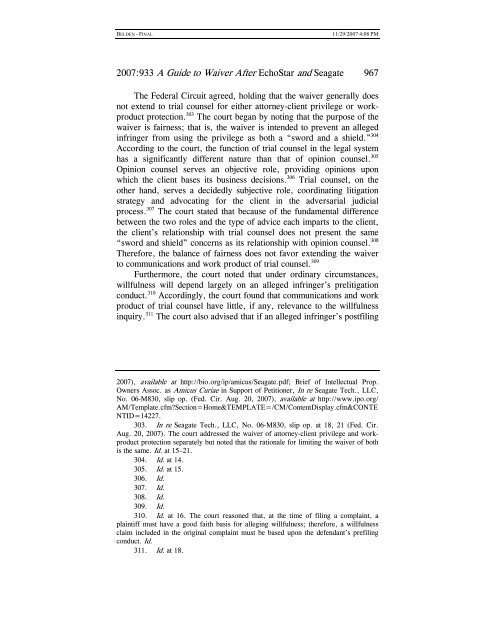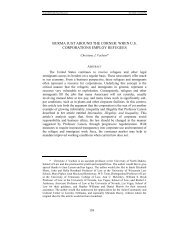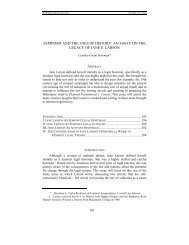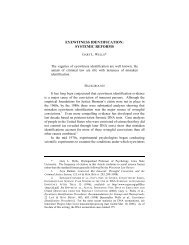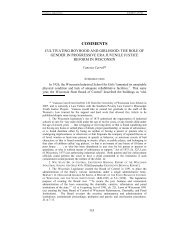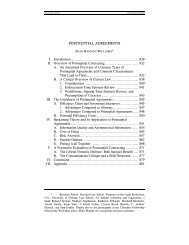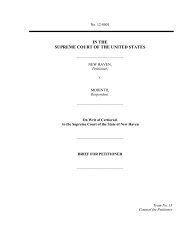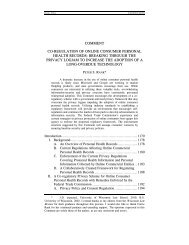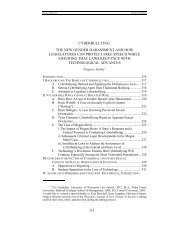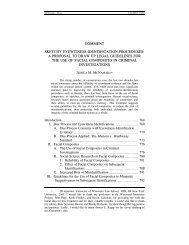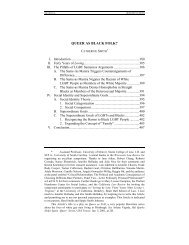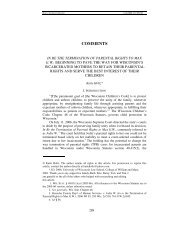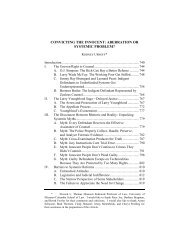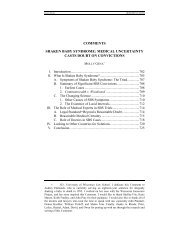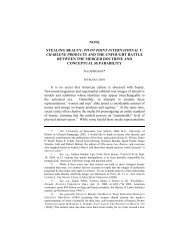note a guide to waiver after echostar and seagate - UW Law School
note a guide to waiver after echostar and seagate - UW Law School
note a guide to waiver after echostar and seagate - UW Law School
You also want an ePaper? Increase the reach of your titles
YUMPU automatically turns print PDFs into web optimized ePapers that Google loves.
BELDEN - FINAL 11/29/2007 4:08 PM<br />
2007:933 A Guide <strong>to</strong> Waiver After EchoStar <strong>and</strong> Seagate 967<br />
The Federal Circuit agreed, holding that the <strong>waiver</strong> generally does<br />
not extend <strong>to</strong> trial counsel for either at<strong>to</strong>rney-client privilege or workproduct<br />
protection. 303 The court began by noting that the purpose of the<br />
<strong>waiver</strong> is fairness; that is, the <strong>waiver</strong> is intended <strong>to</strong> prevent an alleged<br />
infringer from using the privilege as both a “sword <strong>and</strong> a shield.” 304<br />
According <strong>to</strong> the court, the function of trial counsel in the legal system<br />
has a significantly different nature than that of opinion counsel. 305<br />
Opinion counsel serves an objective role, providing opinions upon<br />
which the client bases its business decisions. 306 Trial counsel, on the<br />
other h<strong>and</strong>, serves a decidedly subjective role, coordinating litigation<br />
strategy <strong>and</strong> advocating for the client in the adversarial judicial<br />
process. 307 The court stated that because of the fundamental difference<br />
between the two roles <strong>and</strong> the type of advice each imparts <strong>to</strong> the client,<br />
the client’s relationship with trial counsel does not present the same<br />
“sword <strong>and</strong> shield” concerns as its relationship with opinion counsel. 308<br />
Therefore, the balance of fairness does not favor extending the <strong>waiver</strong><br />
<strong>to</strong> communications <strong>and</strong> work product of trial counsel. 309<br />
Furthermore, the court <strong>note</strong>d that under ordinary circumstances,<br />
willfulness will depend largely on an alleged infringer’s prelitigation<br />
conduct. 310 Accordingly, the court found that communications <strong>and</strong> work<br />
product of trial counsel have little, if any, relevance <strong>to</strong> the willfulness<br />
inquiry. 311 The court also advised that if an alleged infringer’s postfiling<br />
2007), available at http://bio.org/ip/amicus/Seagate.pdf; Brief of Intellectual Prop.<br />
Owners Assoc. as Amicus Curiae in Support of Petitioner, In re Seagate Tech., LLC,<br />
No. 06-M830, slip op. (Fed. Cir. Aug. 20, 2007), available at http://www.ipo.org/<br />
AM/Template.cfm?Section=Home&TEMPLATE=/CM/ContentDisplay.cfm&CONTE<br />
NTID=14227.<br />
303. In re Seagate Tech., LLC, No. 06-M830, slip op. at 18, 21 (Fed. Cir.<br />
Aug. 20, 2007). The court addressed the <strong>waiver</strong> of at<strong>to</strong>rney-client privilege <strong>and</strong> workproduct<br />
protection separately but <strong>note</strong>d that the rationale for limiting the <strong>waiver</strong> of both<br />
is the same. Id. at 15–21.<br />
304. Id. at 14.<br />
305. Id. at 15.<br />
306. Id.<br />
307. Id.<br />
308. Id.<br />
309. Id.<br />
310. Id. at 16. The court reasoned that, at the time of filing a complaint, a<br />
plaintiff must have a good faith basis for alleging willfulness; therefore, a willfulness<br />
claim included in the original complaint must be based upon the defendant’s prefiling<br />
conduct. Id.<br />
311. Id. at 18.


